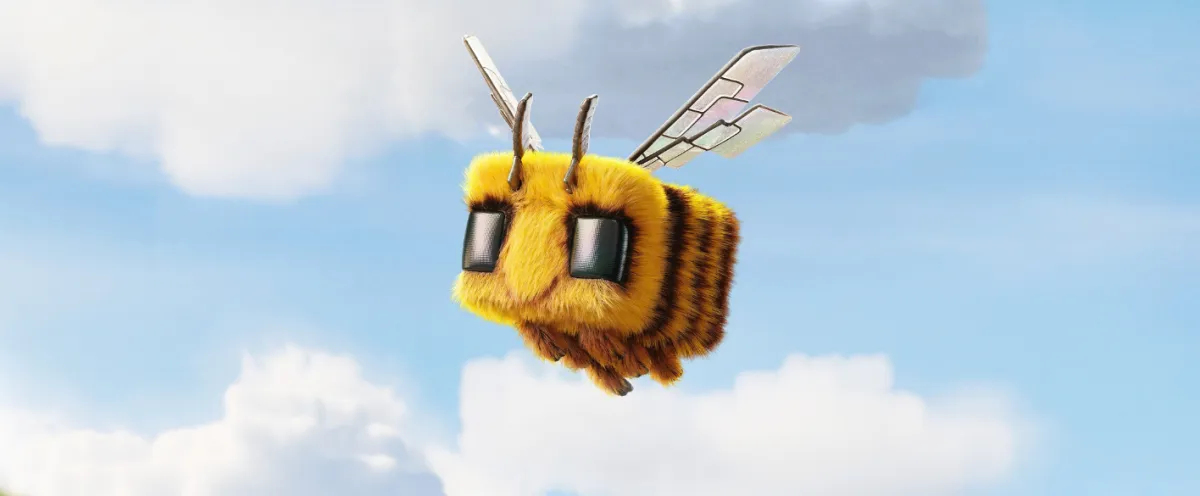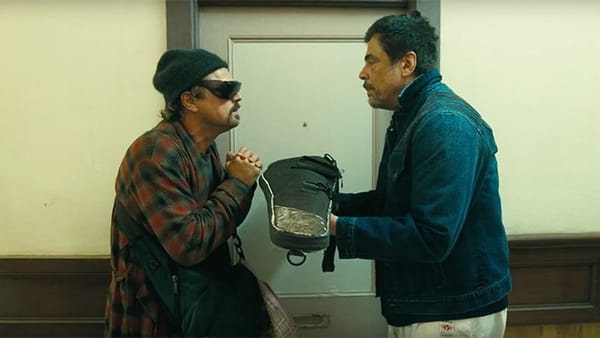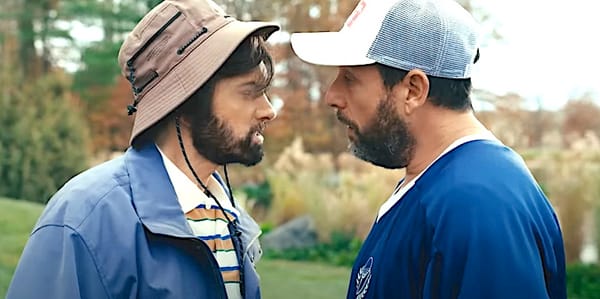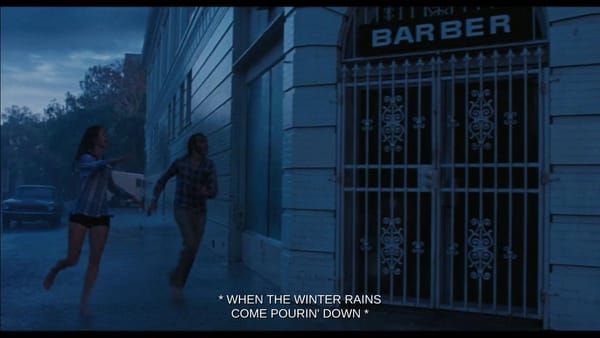A World-Class Achievement

On A Minecraft Movie and a Future of Media
Team,
It’s a hit!
This opening weekend, movie-going audiences dug into A Minecraft Movie, making it the no. 1 film in the U.S. and 75 global markets, bringing in an impressive $313.7 million – the largest domestic opening weekend of 2025, the biggest since July, and Warner Bros.’ largest opening weekend since 2023. This is truly a world-class achievement!
- Michael De Luca and Pamela Abdy, co-chairs and co-CEOs of Warner Bros. Motion Picture Group
I - The Black Hole
I had no intention of writing about A Minecraft Movie, but there was no way I was going to miss it. The most superficial and obvious reason for this is the fact that I tutor 6th graders. Other than Roblox, Minecraft is all they talk about. I asked them if they were seeing the movie. All of them responded in the affirmative. Why?
"It's Minecraft," one shrugged.
They asked if I, an adult, would have any interest in it.
“I do. To see what they’re feeding you,” I said.
And that’s true. It's important to understand what’s expected of our children vis-à-vis their cultural diets. But I also loved Minecraft for a couple of years myself. I caught it right as it entered full release in November 2011, coinciding with the time I made friends who taught me it was okay, even cool, to be nerdy; it wasn’t something of which I needed to be ashamed.
I was also curious how director Jared Hess would fare at the helm. Like many who came of age in the 2000s, I fell in love with his movies Napoleon Dynamite and Nacho Libre. They informed the way I interacted with the world. Yes, I had a Vote for Pedro shirt. Yes, I had a Napoleon Dynamite action figure which recited lines from the movie. Nacho Libre’s "big hug little hug, big kiss little kiss" scene, too, became a touchstone for my family when we shared affection.
Finally, I had a feeling A Minecraft Movie would make a lot of money. I’d never claim to have predicted the truly mind-boggling amount of cash it’s generated, but I knew Hollywood insiders were lowballing it to a serious degree. Even the Monday morning quarterbacks couldn’t quite account for its success. On the show business podcast The Town, host Matt Belloni and guest Lucas Shaw prognosticated up and down about its success, never quite zeroing in on what made it such a big hit. It was the show’s producer, Craig, sort of the Pinky to Matt’s Brain, who thought outside the box and delivered the obvious and correct answer:
“It’s an extension of what [kids] do at home.”
Belloni and Shaw effectively ignore him, but the remark does set off an all-too-brief digression into what Matthew Ball (not a guest on the podcast) calls the Black Hole Theory of video games.
“They’re IP ecoysystems,” Belloni says on behalf of Ball, “that Gen Z and Gen Alpha sort of live in.”
Belloni and Shaw then wander off into a discussion about how movies just aren’t the way they used to be, but this did direct me to Ball's own writing on the subject: a perpetually updated powerpoint presentation that stretches to 230 slides.
"Black Hole Games," Matthew Ball writes, "refers to a phenomenon whereby a massive franchise title has such a hold on players that it's nearly impossible for a new game to pull them away."
"To compete with a Black Hole game," he continues, a would-be competitor must offer an experience that can overcome a player's . . ."
He goes on to a list reasons why it's difficult to break a player out of a Black Hole game, from which I'll offer some highlights.
- Hundreds or thousands of hours achieving skill mastery (and comfort)
I find this interesting because it offers the most obvious and most subtle aspects of the Black Hole game in tandem. More specifically, it offers them as flip sides of the same coin. The very fact of a game requiring so much time on behalf of the player necessitates an affinity for it. It becomes a sort of digital home.
- Hundreds of millions (or billions) of player connections and playmates, only a fraction of which will be on another game
A Black Hole Game offers not only a digital home, but a seemingly infinite number of possible relationships to develop in that home. This is not to say, of course, that infinite numbers of relationships will develop ipso facto, but the illusion of this possibility is enough to keep players locked in.
- Confidence that their scarce time, money, effort, and social signaling will be durably rewarded
Ironic, considering we live in a media epoch during which we nominally have access to more content than ever before, but this is what keeps people sucked into a single piece of media. The joke here being that that time, money, effort, and social signaling is of course never actually rewarded. It just loops back in on itself like an ouroboros.
Movie producers flock to big IP, but not all big IP works. Joker: Folie a Deux bombed. The Flash flopped. Haunted Mansion was hoisted by its own petard. These franchises failed with audiences because no longer is the system structured around one movie doing well for a few weeks or months, and then another movie doing well for a few weeks or months. The box office is staccato, and wholly dependent on event. Steven Spielberg called it way before anyone else.
“Steven Spielberg predicted an ‘implosion’ in the film industry is inevitable,” Paul Bond wrote in 2013, “whereby a half dozen or so $250 million movies flop at the box office and alter the industry forever.”
Spielberg did not, however, predict a population-decimating pandemic as the Rubicon moment. During this time, video games exploded as the go-to entertainment. In June 2020, "video game spending in the US reached its highest point since 2010," according to The Verge. Streaming, too, continued to chew up market share like cud. But the theatrical experience had been endangered since at least 2015: the year I entered film school. I remember Beasts of No Nation, Netflix’s first distributed film, playing to empty theaters at IFC Center down the block from the playpen where I, my fellow students, and our professors blissfully ignored the sea change that was happening right at our ankles. It made back 1.5% of its budget, but the point was never for it to make back its budget. The film existed to create market value for a tech company. Other tech companies, like Amazon and Apple, have tried to follow suit while traditional media companies, or what’s left of them—NBCUniversal, Warner Bros. Discovery, Paramount Global, Disney—stagger behind, throwing things at the wall to see what hits. Warner Bros. found a hit in A Minecraft Movie, but only because it aligns with the cultural moment pretty much accidentally.
The way we consume media is changing before our eyes, and we're heading into a cultural landscape that's nothing but black holes. You find one thing--your black hole--and you consume everything associated with it. Books. Videos. Music. Memes. And it consumes you. A Minecraft Movie is successful because it is a portal: an invitation back into the Black Hole IP. It is permission to enjoy.
II - A Real Movie
I mentioned to a friend that I had gone to a screening of the movie, and he joked, "seeing the Minecraft movie is not a screening."
"Fair enough," I said obligingly. I wasn't in the mood to argue. We continued the bit and I mumbled gentle banter with him like "pressing play on the content."
But it is a screening. Whether we like it, A Minecraft Movie is a
real movie. I went to a Thursday night, 8:00PM IMAX showing, mostly to avoid the kids. It was late enough and expensive enough and my assumption that parents would wait until the weekend to emerge from their dens was correct. There were teens, some nerds my age, and at least one father and son pairing who both thought Jennifer Coolidge was hilarious.
The teens were memeing it before it was even over. One pulled out his phone, searched for the Martin Scorsese ABSOLUTE CINEMA meme, and showed it to his friends. I tried my hardest to stay present with the movie, and for a time I really was on its side. The opening act is a great Jared Hess movie. I was reminded of the joy I felt as a child watching a funny and sincere movie that made an attempt to touch the heart of flyover state America. Its loving fixation with 80s aesthetics, its inspired sense of a child's creativity, and its flyover state absurdist sense of humor endeared me to it enormously.
The montage about 20 minutes in, for example, is pure Hess: chipper music, overhead shots of hands drawing and coloring, and carefully placed etchings on desks give the scene--and the film around it--a real lived-in quality. I became briefly convinced that I was watching a genuine coup. But I was not.
Once our intrepid protagonists end up in the Minecraft world, the movie resorts to obnoxious meme-peddling and generic action-adventure plotting. Jack Black is not funny in this, and his propensity for breaking out into song got me clenching my teeth on more than one occasion.
I texted with my cousin about it afterward; he's a huge Minecraft player. I asked him how many hours he's put into the game.
"Fuck," he texted me. "Rough estimate, probably like 1000."
"Did you like the movie?" I asked.
"I went in expecting a movie for 12 year olds, but what I got was a movie for 7 year olds."
There was a brief break in our correspondence.
"Do you think it was justified for
them to make the movie in the first place?" I got later.
I told him I thought that was a very good question. "When is an adaptation ever justified?" I responded. "To make money? To express something? I would say it was justified in the sense that it made a lot of money. I would not say the artistic value justifies the fact that it exists."
"Fair enough," he said.




